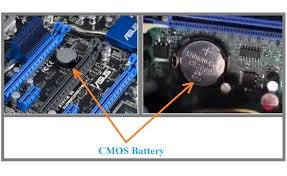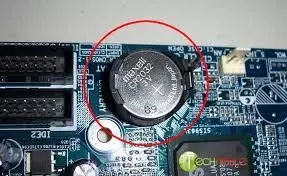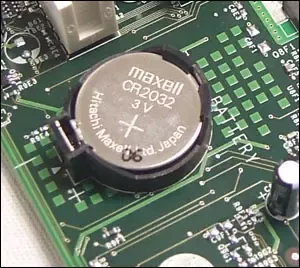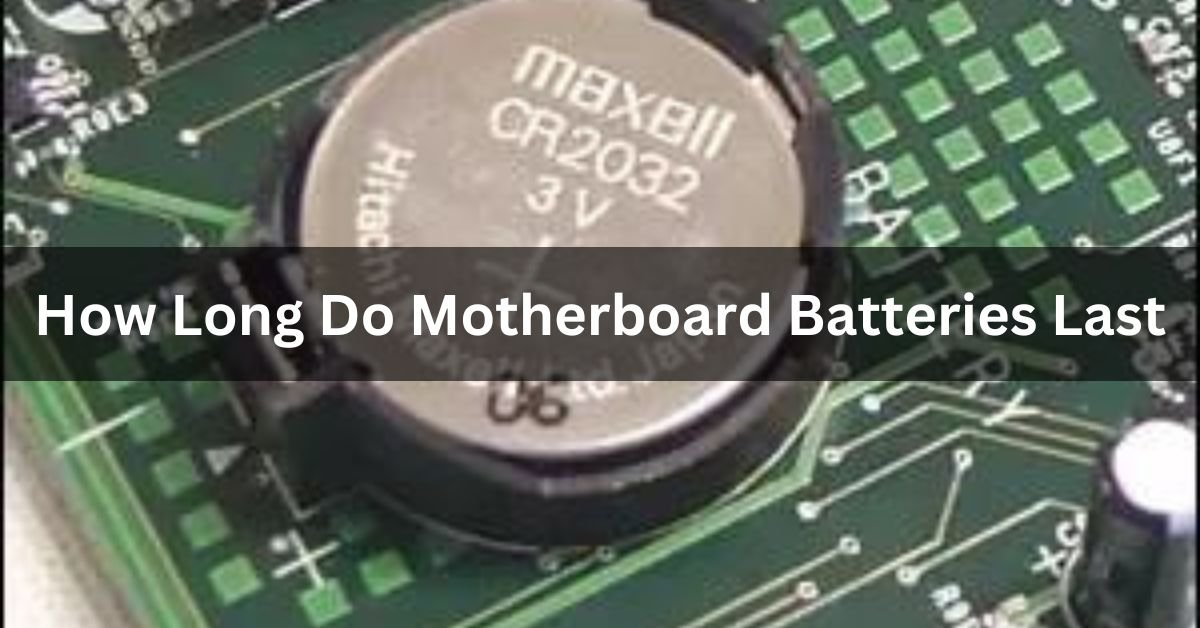Motherboard batteries, also known as CMOS batteries, typically last for several years before needing replacement. These batteries are primarily responsible for maintaining the system’s BIOS settings, such as date and time, when the computer is powered off. When they start to fail, you might notice issues such as incorrect date and time settings or BIOS errors during startup.
Motherboard batteries typically last around 5 to 10 years. They keep the computer’s internal clock running when it’s turned off and store BIOS settings. When they die, the computer may lose track of time or settings.
In this article, we will discuss “How Long Do Motherboard Batteries Last”.
How Long Does a CMOS Battery Last and How to Prolong Lifespan?

A CMOS battery usually lasts 3 to 10 years. To prolong its lifespan, avoid excessive power cycling, maintain moderate temperatures, and ensure proper ventilation.
Additionally, keep the system updated and utilize power-saving settings to optimize battery longevity.
Standard Lifespan of a CMOS Battery?
The standard lifespan of a CMOS battery is typically between 3 to 10 years. However, its longevity can vary depending on factors like usage, temperature, and the specific device it powers, such as a computer motherboard or other electronic devices.
Detecting a Failing CMOS Battery?
Detecting a failing CMOS battery involves noticing signs like frequent loss of date and time settings, repeated prompts to enter BIOS setup, or difficulty booting up the computer. These indicators suggest the battery may need replacement.
Strategies to Extend the Lifespan of the CMOS Battery?
To extend the lifespan of the CMOS battery, avoid frequent power cycling, maintain moderate temperatures, and ensure proper ventilation.
Additionally, keeping the system updated and using power-saving settings can help preserve battery life and optimize its longevity.
What is the expected life of the CMOS Battery?
The expected life of a CMOS battery is typically between 3 to 10 years. However, its lifespan may vary depending on factors like usage, temperature, and the specific device it powers, such as a computer motherboard or other electronic devices.
How long can a motherboard battery last?
A motherboard battery can typically last between 3 to 10 years. However, its lifespan can vary based on factors such as usage, environmental conditions, and the specific device it powers, such as a computer motherboard or other electronic devices.
How often should you change your motherboard battery?
You should consider changing your motherboard battery every 3 to 10 years, depending on factors like usage frequency, environmental conditions, and the specific device it powers, such as a computer motherboard or other electronic devices.
How do I know if my motherboard battery is bad?
You can tell if your motherboard battery is bad if your computer consistently loses date and time settings, prompts you to enter BIOS setup frequently, or has difficulty booting up. These issues indicate the battery may need replacement.
How Long Does a CMOS Battery Last?
A CMOS battery typically lasts between 3 to 10 years. However, its lifespan can vary based on factors like usage patterns, temperature, and the specific device it powers, such as a computer motherboard or other electronic devices.
How to Extend the Lifespan of the CMOS Battery?
To extend the lifespan of the CMOS battery, minimize unnecessary power cycling, avoid extreme temperatures, and ensure proper ventilation around the device.
Additionally, keeping the system regularly updated and using power-saving settings can help preserve battery life.
Read: Are Gigabyte Motherboards Good – Ultimate Guide – 2024
CMOS Battery Failure Signs?
Signs of CMOS battery failure include frequent loss of date and time settings, recurring prompts to enter BIOS setup, and difficulty booting up the computer. These issues suggest the battery may need replacement.
Read: Can Motherboards Bottleneck – The Ultimate Guide of 2024!
How long should a CMOS battery last?
A CMOS battery should last around 3 to 10 years. However, its lifespan can vary based on factors like usage, temperature, and the specific device it powers, such as a computer motherboard or other electronic devices.
How long does CMOS battery (3V) on a motherboard last?

A CMOS battery (3V) on a motherboard typically lasts between 3 to 10 years. However, factors such as usage frequency, environmental conditions, and the specific device it powers can influence its lifespan before needing replacement.
What Is A Lifespan Of A Cmos Battery?
The lifespan of a CMOS battery, which powers the memory chip on a computer’s motherboard, generally lasts between 3 to 10 years. However, its longevity can vary depending on factors like usage and environmental conditions.
CMOS Battery Lifespan?
The lifespan of a CMOS battery typically ranges from 3 to 10 years. However, factors like usage patterns, temperature, and the specific device it powers can influence how long it lasts before needing replacement.
How Do You Know That Your CMOS Battery Is Dying?
You can tell your CMOS battery is dying if your computer consistently loses its date and time settings, prompts you to enter BIOS setup frequently, or experiences difficulty booting up. These are signs it may need replacement.
Recognizing the Need for a CMOS Battery Replacement?
Recognizing the need for a CMOS battery replacement involves identifying symptoms like frequent date and time resets, prompts to enter BIOS setup, or difficulties booting the computer. These issues indicate the battery may be depleted and require replacement.
Replacing a CMOS Battery?
Replacing a CMOS battery involves removing the old battery from the motherboard and installing a new one. This is necessary when the old battery is depleted, leading to issues like date and time resets or difficulties booting up the computer.
After Replacing the CMOS Battery?
After replacing the CMOS battery, restart your device. It should retain system settings properly. If not, enter the BIOS setup and manually adjust settings like date, time, and boot order if needed for smooth operation.
What is the average lifespan of a CMOS battery?
The average lifespan of a CMOS battery is typically between 3 to 10 years. However, factors like usage patterns, ambient temperature, and the specific device it powers can influence how long it lasts before needing replacement.
How do I know if my CMOS battery needs replacing?
You may need to replace your CMOS battery if your computer consistently loses date and time settings, prompts you to enter BIOS setup frequently, or experiences difficulty booting up. These are signs of a failing CMOS battery.
How Long Does A CMOS Battery Last Without Power?
A CMOS battery can retain stored information without power for several years. However, the exact duration depends on factors like battery quality, ambient temperature, and the amount of charge remaining in the battery when power is disconnected.
How Long CMOS battery Remove?
Removing the CMOS battery usually requires only a few minutes. After turning off and unplugging your computer, you can open the case, locate the battery on the motherboard, gently remove it, and wait for a brief period before reinserting it.
CMOS Battery Lifespan Laptop?
The CMOS battery lifespan in a laptop typically ranges from 3 to 5 years. However, factors like usage patterns, temperature, and the specific laptop model can affect how long the battery lasts before needing replacement.
CMOS Battery Failure Symptoms?
CMOS battery failure symptoms include frequent loss of date and time settings, recurring prompts to enter BIOS setup, and difficulty booting up the computer. These issues indicate that the battery may need replacement to restore proper functionality.
CMOS Battery Replacement?
CMOS battery replacement involves removing the old, depleted battery from the motherboard and installing a new one.
This is often necessary when the computer starts experiencing issues such as losing system settings or difficulty booting up properly.
CMOS Battery On Motherboard?
The CMOS battery on the motherboard is a small, coin-shaped battery that powers the CMOS memory chip.
It helps retain system settings like date, time, and hardware configurations, even when the computer is turned off, ensuring smooth startup and operation.
How can you detect if your CMOS battery is dead?

You can detect if your CMOS battery is dead if your computer consistently loses its date and time settings, or if it prompts you to enter BIOS setup frequently upon startup.
FAQs:
1. How long does the CMOS battery last?
The CMOS battery typically lasts between 3 to 10 years. However, its lifespan can vary depending on factors like usage, temperature, and the specific device it powers, such as a computer motherboard.
2. How long does it take to wait after removing a CMOS battery?
After removing a CMOS battery, waiting for around 5 to 10 minutes is usually sufficient. This allows the residual charge to dissipate and ensures that the system settings are properly reset.
3. Can a dead CMOS battery stop a computer from booting?
Yes, a dead CMOS battery can prevent a computer from booting properly. Without power from the CMOS battery, the system may fail to retain essential settings needed for the boot process.
4. How long does the CMOS coin battery CR 2032 3V last?
The CR2032 3V CMOS coin battery typically lasts around 3 to 10 years, depending on factors like usage, temperature, and the specific device it powers, such as a computer motherboard.
5. What causes a CMOS battery to drain?
A CMOS battery drains over time due to its natural chemical processes and usage. Factors like age, temperature fluctuations, and excessive power cycling can accelerate its depletion, leading to the loss of system settings.
6. What happens when the CMOS battery is removed and put back?
When the CMOS battery is removed and put back, the computer may lose its system settings temporarily. Upon restarting, it may prompt you to enter BIOS setup to reconfigure settings like date, time, and boot order.
7. What do I do after replacing the CMOS battery?
After replacing the CMOS battery, restart your computer. It should retain system settings properly. If not, enter the BIOS setup and manually adjust settings like date, time, and boot order if needed.
8. What happens if I boot my computer without the CMOS battery?
If you boot your computer without the CMOS battery, it may lose its system settings, such as date, time, and hardware configurations. You might encounter errors or prompts to reconfigure settings upon startup.
9. Is a CMOS battery a chargeable battery?
No, a CMOS battery is not rechargeable. It’s a small, coin-shaped battery that powers the CMOS memory chip, which stores system settings in a computer. Once depleted, it needs replacement.
10. Does a bad CMOS battery cause charging problems with computer battery charging?
Yes, a bad CMOS battery can cause issues with charging the computer’s main battery. When the CMOS battery is faulty, it can disrupt power management functions, affecting the charging process.
11. What happens if a CMOS battery dies?
If a CMOS battery dies, the computer may forget its settings like the date and time and BIOS configurations. It can cause startup issues or prompt for setup every time it’s turned on.
Conclusion:
In conclusion, motherboard batteries, also known as CMOS batteries, typically last between 3 to 10 years. They maintain crucial system settings like the date and time when the computer is turned off. Signs of a failing battery include incorrect settings and difficulty booting up. To prolong the lifespan, avoid frequent power cycling and ensure proper ventilation. After replacement, restart the device to retain settings.
